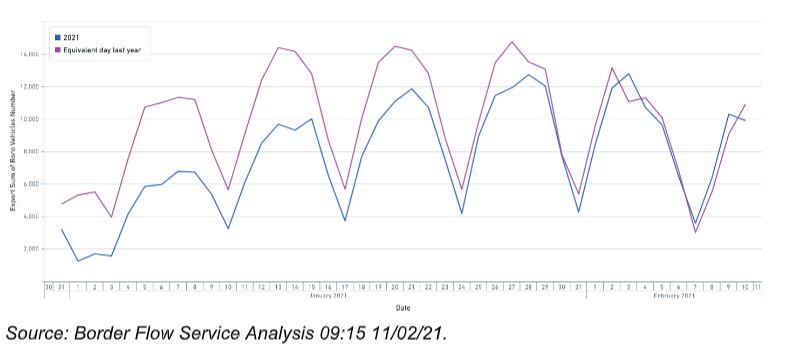Did EU exports really drop 68% in January?
“The volume of exports going through British ports to the EU fell by a staggering 68% last month compared with January last year, mostly as a result of problems caused by Brexit, the Observer can reveal.”
A report earlier this month in the Observer claimed that the volume of UK exports to the EU going through ports fell by 68% in January 2021, compared to 2020.
It claimed that this was mostly as a result of problems with Brexit, following the end of the transition period (during which the UK traded with the EU much as it did while a member) on 31 December 2020.
The figure was attributed to the Road Haulage Association (RHA) from a survey of its members, but the RHA has not responded to any further questions detailing how that figure was calculated.
In light of this, it’s worth looking at other data which tells a slightly different story.
Honesty in public debate matters
You can help us take action – and get our regular free email
What’s happened to exports?
Official statistics on overseas goods trade in January 2021 are due to be published on 12 March. However, the Cabinet Office did provide Full Fact with figures from government administrative and management data which give an early indication, while noting that its figures “are not official statistics and are not, therefore, validated as such for publication.”
These show that in January 2021, the total number of outbound “roll-on roll-off” freight vehicles was at 73% of the January 2020 level, catching up towards the end of the month, and from 1 to 11 February, outbound roll-on roll-off freight was at 98% of 2020 levels.
However, the Cabinet Office also said that empty heavy goods vehicles (HGVs) represented 23% of total outbound flow, an increase of around 9-15%.

Roll-on roll-off refers to vehicles which drive onto a ferry or a Channel Tunnel train and then drive off after landing in their destination country.
Roll-on roll-off doesn’t include freight moved in other ways, such as “lift-on lift-off” (containers which are moved by crane on and off container ships), or dry and liquid bulk goods such as coal and oil.
It’s unclear exactly whether the RHA’s survey only captured roll-on roll-off freight and whether it looked at the number of vehicles (as is the case with the Cabinet Office’s figure) or measured the tonnage or value of exports.
The 73% figure also includes outbound roll-on roll-off freight going from Great Britain to anywhere in the world and to Northern Ireland, while the RHA’s survey appeared to only estimate exports to the EU.
All this means the two figures aren’t particularly comparable. But the 73% figure (indicating a 27% reduction compared to the year before), coupled with the 9-15% increase in empty outbound HGVs, does tell a slightly different story to the RHA’s survey data which reported a 68% drop in EU exports.
What was the reason?
The Observer also claimed that a fall in exports was mainly due to Brexit.
In response, the Cabinet Office told us that goods exports to the EU increased in December 2020, indicating a stockpiling of goods ahead of the new year. This suggests that some of the drop off in January may have been as a result of demand having been shifted earlier into December in anticipation of difficulty with getting goods across the border.
Published data from HMRC shows that in each month of 2020 from January to October, the value of goods exported to the EU was considerably lower (8% to 33%) than the equivalent month of 2019.
In November 2020 exports were 15% up on November 2019 and in December 2020 exports were 1% higher than in December 2019.
This suggests that there was some increased level of exporting in the final two months of the year, compared to the baseline, and so some drop off in January 2021 may have been expected.
And of course it’s worth considering the other big challenge which has affected that baseline: Covid-19.
The Observer article claims that most of the drop-off in exports was due to Brexit, but January 2021 also saw the re-imposition of lockdown in the UK, which undoubtedly had some impact.
We can see this by looking at the data from before and after the first lockdown, when the EU’s relationship with the UK did not change.
Back in February 2020, EU exports by value were 9% lower than in February 2019. But in March 2020, when the first lockdown was announced, EU exports were 24% lower than in March 2019.
By May 2020, the value of goods exported to the EU was down 33% against May 2019.
While it’s impossible to disentangle exactly how much of the fall in exports can be explained by each factor, the evidence of lockdown’s impact on exports should be considered when looking at the January 2021 data.
Correction 19 February 2021
This article has been corrected to include details on the increase in the number of empty outbound HGVs at the beginning of the year, to provide more context around the Cabinet Office’s 73% figure.